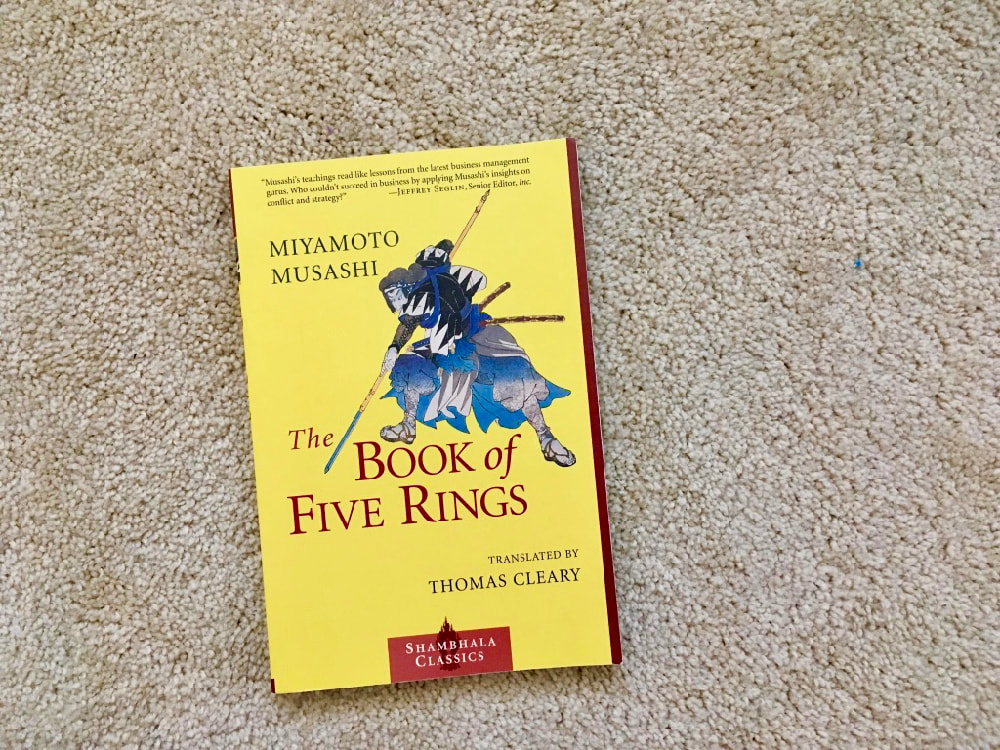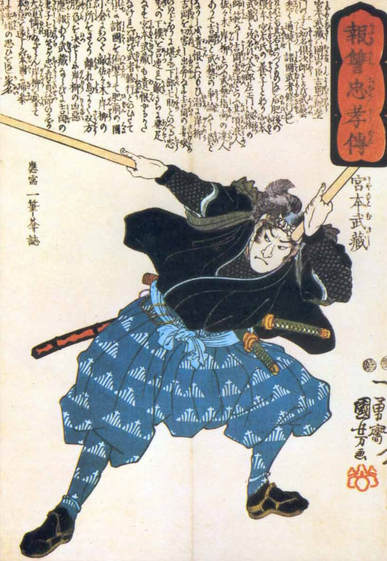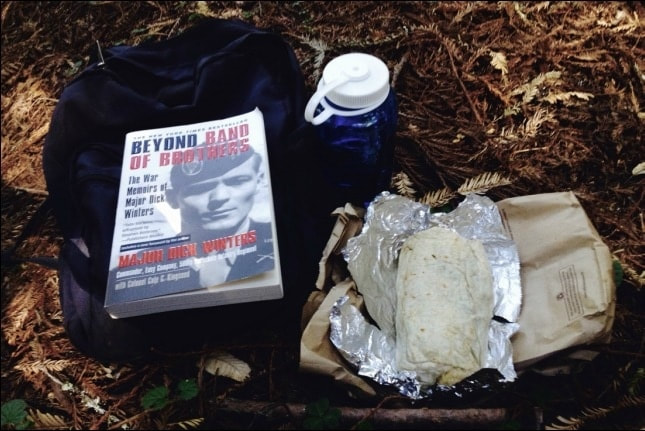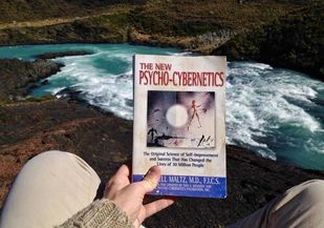| " If you want to learn the science of martial arts, meditate on this book; let the teacher be the needle, let the student be the thread, and practice unremittingly. " - Miyamoto Musashi, The Book of Five Rings |
In 1643, a self-taught, undefeated master samurai put down his katana and wakizashi and wrote one of history's most powerful self-help books. Not just intended for men-at-arms, Miyamoto Musashi's The Book of Five Rings, maps out a path to mastery in all walks of life.
In fact, in the Translator's Preface, Thomas Cleary begins with "a molecule of linguistic anthropology," by spotlighting the Japanese word shin-ken, which means "real sword." It originated in feudal Japan, around the time of Musashi and the samurai caste, but continues to live in the culture to this day. Shin-ken is used to mean something done with "deadly seriousness" and "utter earnestness." And Thomas Cleary's translation of Five Rings is an accessible, applicable version of Musashi's ancient teachings on leadership and discipline for us to reflect on today and sharpen our own sense of shin-ken.
I first heard about this book after Navy Seal Jocko Willink, author of Extreme Ownership, recommended it on his weekly podcast. I admittedly had low expectations, wondering if a long-dead samurai's warrior code would be at all relevant to me, a nerdy, non-violent marketer living in San Francisco. But I promised myself long ago that I would always take up the recommendations of people I greatly admire like Jocko to trace their own creative lineage and influences.
I was not disappointed. The Book of Five Rings is a concise instruction manual for fostering inner discipline, and a refreshingly relevant work from antiquity. It's also a perfect afternoon- (hike) -length read. [JG]
In fact, in the Translator's Preface, Thomas Cleary begins with "a molecule of linguistic anthropology," by spotlighting the Japanese word shin-ken, which means "real sword." It originated in feudal Japan, around the time of Musashi and the samurai caste, but continues to live in the culture to this day. Shin-ken is used to mean something done with "deadly seriousness" and "utter earnestness." And Thomas Cleary's translation of Five Rings is an accessible, applicable version of Musashi's ancient teachings on leadership and discipline for us to reflect on today and sharpen our own sense of shin-ken.
I first heard about this book after Navy Seal Jocko Willink, author of Extreme Ownership, recommended it on his weekly podcast. I admittedly had low expectations, wondering if a long-dead samurai's warrior code would be at all relevant to me, a nerdy, non-violent marketer living in San Francisco. But I promised myself long ago that I would always take up the recommendations of people I greatly admire like Jocko to trace their own creative lineage and influences.
I was not disappointed. The Book of Five Rings is a concise instruction manual for fostering inner discipline, and a refreshingly relevant work from antiquity. It's also a perfect afternoon- (hike) -length read. [JG]
THEMES
Authentic Guides vs. Posers
The Wind Scroll, as well as many other passages throughout, give voice to Musashi's warnings of false teachers, both external and internal. "What I see on inquiry into other schools is that some are pretentious talkers, and some perform fancy maneuvers with their hands; even though they may look good to people, there is surely no heart there at all."
His main criticism with competing Japanese schools that profess to instruct martial arts, is that they blind its students by teaching them a narrow vision that is too focused on "the small,"—concrete tactics that ignore "the large," context—namely, a warrior's mental landscape and discipline.
Mental Discipline & Training
Skills with tools and practiced movements, Musashi contends, are only a part of the true way of the martial arts. Inner discipline, the controlling of the will, the regulating of moods amidst changing externalities, one's intuition of an enemy's motives and one's ability to trust that intuition, the power to still one's mind and trust one's training, to see the opponent's next steps, these are required to wield the sword and survive.
Will & Mood
In The Killing Sword section, Musashi explores the role of the will and the mood and their relationship. He likens the will to "the master of the house" and the mood as "the servant". Both essential, but the master must always be in control of the house, and therefore the servant is controlled by him. Watch that the master does so; that the mood, especially at important times, is controlled to the will.
Small & Large
In The Fire Scroll, Musashi emphasizes the importance of being able to focus on both the small minutiae and suddenly, rapidly shifting to a wider perspective. Eventually, this ability can be mastered until "the commander" and "the soldier" inside a man exist as one, and both known one another, and even still, the enemy troops become one's own troops, to be directed through both small and large actions.
Mountain & Sea
Again from The Fire Scroll, Musashi emphasizes the importance of differentiating one's own physical movements and mental landscape as the opposite of an opponent. Establish one's energy as solid or fluid, depending on the opponent's own, in order to separate oneself from their game and play one's own, to control the situation.
The Wind Scroll, as well as many other passages throughout, give voice to Musashi's warnings of false teachers, both external and internal. "What I see on inquiry into other schools is that some are pretentious talkers, and some perform fancy maneuvers with their hands; even though they may look good to people, there is surely no heart there at all."
His main criticism with competing Japanese schools that profess to instruct martial arts, is that they blind its students by teaching them a narrow vision that is too focused on "the small,"—concrete tactics that ignore "the large," context—namely, a warrior's mental landscape and discipline.
Mental Discipline & Training
Skills with tools and practiced movements, Musashi contends, are only a part of the true way of the martial arts. Inner discipline, the controlling of the will, the regulating of moods amidst changing externalities, one's intuition of an enemy's motives and one's ability to trust that intuition, the power to still one's mind and trust one's training, to see the opponent's next steps, these are required to wield the sword and survive.
Will & Mood
In The Killing Sword section, Musashi explores the role of the will and the mood and their relationship. He likens the will to "the master of the house" and the mood as "the servant". Both essential, but the master must always be in control of the house, and therefore the servant is controlled by him. Watch that the master does so; that the mood, especially at important times, is controlled to the will.
Small & Large
In The Fire Scroll, Musashi emphasizes the importance of being able to focus on both the small minutiae and suddenly, rapidly shifting to a wider perspective. Eventually, this ability can be mastered until "the commander" and "the soldier" inside a man exist as one, and both known one another, and even still, the enemy troops become one's own troops, to be directed through both small and large actions.
Mountain & Sea
Again from The Fire Scroll, Musashi emphasizes the importance of differentiating one's own physical movements and mental landscape as the opposite of an opponent. Establish one's energy as solid or fluid, depending on the opponent's own, in order to separate oneself from their game and play one's own, to control the situation.
| Woodblock print of Miyamoto Musashi by artist Utagawa Kuniyoshi. The undefeated samurai is depicted here wielding two bokken, wooden training swords. |
QUOTES
in8. "Learning is the gate to the attainment of the way...not the house."
7. "When the mind does not leave any traces in any particular place, but turns to what lies ahead, with the past dying out like the wake of a boat, not lingering at all... [you will win]."
6. Appearance and intention are fundamental to the art of war. Appearance and intention mean the strategic use of ploys, the use of falsehoods to gain what is real."
5. "When the great function appears, it does not keep to guidelines."
4. "If you do not pursue a genuine path to its consummation, then a little tit of crookedness in the mind will later turn into a major warp. Reflect on this."
3. "In whatever field of endeavor, knowledge of how to avoid losing out to others, how to help oneself, and how to enhance one's honor is part of military science."
2. "The field of martial arts is particularly rife with flamboyant showmanship, with commercial products; they think of themselves as commodities, and also make implements as items of commerce. Distinguishing the superficial and the substantial, I find the attitude has less reality than decoration."
1. "In discerning the lay of the physical situation, there is what is known as positioning yourself with the sun at your back. This means that you take up your stance with the sun behind you. If the situation does not allow you to keep the sun at your back, then you should strive to keep the sun to your right."
7. "When the mind does not leave any traces in any particular place, but turns to what lies ahead, with the past dying out like the wake of a boat, not lingering at all... [you will win]."
6. Appearance and intention are fundamental to the art of war. Appearance and intention mean the strategic use of ploys, the use of falsehoods to gain what is real."
5. "When the great function appears, it does not keep to guidelines."
4. "If you do not pursue a genuine path to its consummation, then a little tit of crookedness in the mind will later turn into a major warp. Reflect on this."
3. "In whatever field of endeavor, knowledge of how to avoid losing out to others, how to help oneself, and how to enhance one's honor is part of military science."
2. "The field of martial arts is particularly rife with flamboyant showmanship, with commercial products; they think of themselves as commodities, and also make implements as items of commerce. Distinguishing the superficial and the substantial, I find the attitude has less reality than decoration."
1. "In discerning the lay of the physical situation, there is what is known as positioning yourself with the sun at your back. This means that you take up your stance with the sun behind you. If the situation does not allow you to keep the sun at your back, then you should strive to keep the sun to your right."
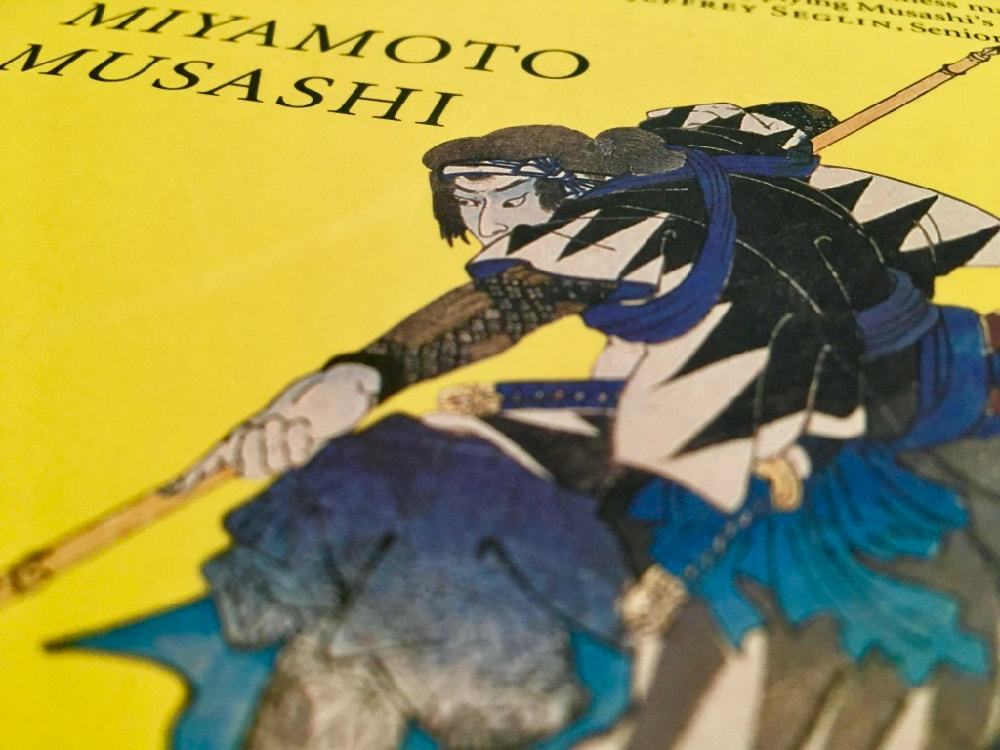
| " ...A thousand days of practice for training and ten thousands days of practice for refinement." - Miyamoto Musashi, The Book of Five Rings |
YOU MAY ALSO LIKE

